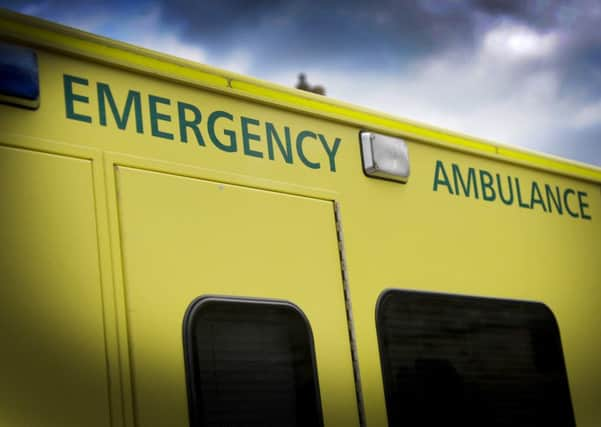As the heatwave hits Sussex ambulance service gives advice on staying safe


While the warmer weather is welcomed by most, it brings with it a likely increase in certain calls for the ambulance service.
Calls relating to sunburn, dehydration and heat stroke typically increase.
Advertisement
Hide AdAdvertisement
Hide AdHigh temperatures can also seriously affect people with long-term conditions such as heart conditions or high blood pressure.
SECAmb is urging these people to be equally cautious during the hot weather.
With the higher temperatures coinciding with England’s final World Cup group game against Belgium on the evening of Thursday (June 28), people are urged to be sensible and support their ambulance service as well as their country. SECAmb Executive Director of Operations, Joe Garcia said: “Of course most people welcome the sunshine and warmer weather and we want everyone to enjoy the sun. However, we also want them to use their common sense, cover up and use sun screen and drink plenty of water.
“Everyone can benefit from following this advice but there some groups in particular whose health can be badly affected by the hotter weather including the very young, older people and anyone with long-term health conditions. If people know of anyone who could be particularly vulnerable, then we’d ask them to check they’re OK.
Advertisement
Hide AdAdvertisement
Hide Ad“The warmer temperatures are likely to lead to an increase in demand and we’d ask the public for their support in remembering that 999 should only be dialed in the event of a serious emergency. People can also get health advice from dialing NHS 111 or by speaking to a pharmacist.”
SECAmb tips for staying safe and cool in the sun
· Stay in the shade or indoors. The sun is at its most dangerous between 11am and 3pm. Find shade under umbrellas, trees or canopies. It is worth remembering that the temperature is at least a couple of degrees cooler if you are by water.
· Use sunscreen and cover up. If you can’t avoid being out in the sun apply sunscreen (factor 15+) and wear a t-shirt, hat and sunglasses.
· Increase your fluid intake. The normal recommended daily intake of fluid is 2.5 litres or 8 glasses per day. In extreme heat experts recommend you drink more and include a range of different fluids.
Advertisement
Hide AdAdvertisement
Hide Ad· Keep your home cool. Keep windows closed while the room is cooler than it is outside. Open them when the temperature inside rises, and at night for ventilation.
· Look after the elderly. Older people are more prone to the effects of heat. If you have older relatives or neighbours you can help simply by checking on them and reminding them to drink plenty and often. Also help them to keep their house as cool as possible, using a fan if necessary.
· Protect children. Keep a close eye on young children, who need plenty of fluids. A good way to check if they are drinking enough is that they are passing urine regularly and that it is not too dark. You should check nappies regularly. Babies and the very young must be kept out of the sun.
· Avoid excessive physical exertion. If you are taking physical exercise you need to drink half a litre of fluid at least half an hour beforehand and continue to replenish your fluids after exercising.
Advertisement
Hide AdAdvertisement
Hide Ad· Know the perils of outdoor eating. Warm summer weather is a perfect breeding ground for bacteria so it is especially important to keep hot foods hot and cold foods cold until you are ready to eat them. When barbecuing always make sure you cook meat until it is piping hot, none of it is pink and all juices run clear.
- Be sensible with alcohol. Hot weather speeds up the effects of alcohol so extra care should be taken when drinking. Alcohol will lead to dehydration so make sure that you alternate alcoholic drinks with water or fruit juice.
· Keep cool at work. The office is often the coolest place to be in a heat wave. Ask your boss for air-conditioning or fans and open windows where possible. Keep windows shaded with blinds and if possible move your working position out of direct sunlight. Have plenty of breaks during the day to get cold drinks and cool down.
Remember, heat stroke can kill. It can develop very suddenly and rapidly lead to unconsciousness. If you suspect someone is suffering from heat stroke call 999 immediately.
Advertisement
Hide AdAdvertisement
Hide AdWhile waiting for the ambulance you should follow the instructions given to you by the ambulance call taker. The following can also help someone suffering from heat stroke:
· If possible, move the person somewhere cooler.
· Increase ventilation by opening windows or using a fan.
· Cool the patient down as quickly as possible by loosening their clothes, sprinkling them with cold water or wrapping them in a damp sheet.
· If they are conscious, give them water or fruit juice to drink.
· Do not give them aspirin or paracetamol.
If you need medical advice or treatment you can also talk to a pharmacist, call NHS 111, visit your GP surgery or Minor Injury Unit.
When to call 999:
Advertisement
Hide AdAdvertisement
Hide AdIf you think a patient is suffering from one of the following you must dial 999 for an ambulance:
- heart attack (e.g. chest pain for more than 15 minutes)
- sudden unexplained shortness of breath
- heavy bleeding
- unconsciousness (even if the patient has regained consciousness)
- traumatic back/spinal/neck pain
You should also call for an ambulance if:
- you think the patient’s illness or injury is life-threatening
- you think the illness or injury may become worse, or even life-threatening on the way to the hospital
- moving the patient/s without skilled people could cause further injury
- the patient needs the skills or equipment of the ambulance service and its personnel